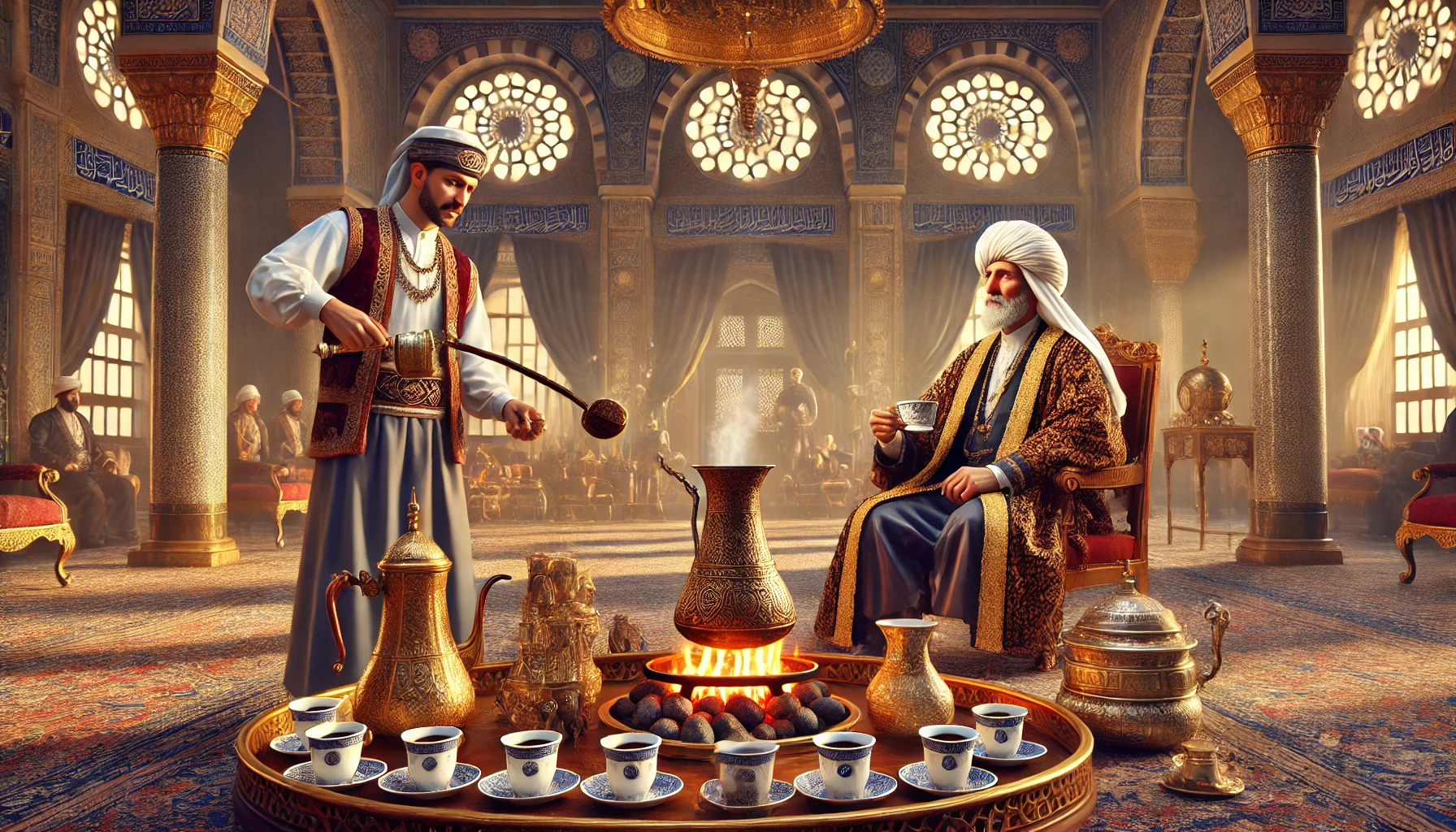The Ottoman Empire was not only a political and cultural powerhouse for centuries, but also a key player in transforming coffee from a spiritual drink into a refined, luxurious, and highly social tradition. With its spread from Yemen to the Ottoman court and beyond, coffee became embedded in the empire’s daily life, rituals, and identity. In this article, we’ll explore how the Ottomans helped shape global coffee culture and turned a humble bean into a cultural cornerstone.
The Arrival of Coffee in the Ottoman World
Coffee was introduced to the Ottoman Empire in the early 16th century, arriving from Yemen. It was first consumed by mystics and scholars, but quickly gained favor among merchants, aristocrats, and eventually the royal court. Its first major point of distribution was Istanbul (then Constantinople), which became the center of a blossoming coffee culture.
The Ottomans did more than adopt coffee—they transformed it. Through innovations in brewing, rituals of serving, and the creation of elaborate coffeehouses, the empire laid the groundwork for many traditions we still recognize today.
The Art of Turkish Coffee
One of the most enduring legacies of the Ottoman Empire is the method of brewing known as Turkish coffee. This technique involves finely ground coffee beans simmered (not boiled) in a small long-handled pot called a cezve. The coffee is poured unfiltered into small porcelain cups, often accompanied by a glass of water and a piece of Turkish delight.
This brewing method emphasizes texture, aroma, and ritual. The presence of grounds at the bottom of the cup even gave rise to a folk tradition of reading fortunes from coffee grounds—an Ottoman blend of mysticism and fun.
Coffee in the Royal Court
In the Ottoman court, coffee became a symbol of refinement, luxury, and intelligence. A designated kahvecibaşı, or Chief Coffee Maker, was appointed to serve the Sultan and oversee the quality of the palace’s coffee service. This position wasn’t just ceremonial; it came with political influence and close proximity to the ruling elite.
The court also developed a formal protocol for coffee service, including how it should be presented, when it should be consumed, and who was allowed to participate. The elegance and precision of this ritual contributed to coffee’s reputation as a beverage of culture and sophistication.
Coffeehouses: Istanbul’s Intellectual Engine
By the mid-1500s, coffeehouses (kıraathane in Turkish) were sprouting up throughout Istanbul. These venues offered more than just drinks—they were places of poetry readings, music, chess, news-sharing, and intense political discussions.
These coffeehouses quickly became central to urban life. They blurred class boundaries, giving merchants, scholars, soldiers, and artists a common place to gather. In many ways, they were the internet cafes of the 16th century, serving as hubs for information exchange.
Political Tensions: Bans and Backlash
Despite its popularity, coffee wasn’t universally loved by the ruling class. Authorities feared that these lively coffeehouses were hotbeds of political dissent. In 1633, under Sultan Murad IV, coffee was banned entirely. The ban was enforced brutally—violators risked severe punishment, even execution.
However, these bans were impossible to maintain for long. Public demand was too strong, and underground coffee culture flourished. Eventually, coffeehouses re-emerged with even more social significance than before, becoming symbols of resistance and public voice.
Women and Coffee in the Ottoman Empire
Although coffeehouses were largely male domains, coffee itself was deeply woven into domestic life. Women played a vital role in preparing and serving coffee at home, and coffee had special significance in marriage traditions.
One unique Ottoman custom was the “coffee test” during marriage proposals. A prospective bride would serve coffee to the groom and his family—and she could signal her interest or disapproval subtly by how she prepared it. A poorly brewed or overly salted cup could signify rejection, while a well-made coffee was seen as a sign of hospitality and acceptance.
Coffee and Religion in Ottoman Society
In contrast to earlier Islamic bans on coffee in Mecca and Cairo, the Ottoman religious establishment gradually accepted coffee, especially as it proved useful during long prayer sessions and scholarly work. Scholars even wrote treatises defending its legality in Islam, arguing that it sharpened the mind and improved concentration without causing intoxication.
Coffee thus gained religious legitimacy in Ottoman society, further embedding it into both daily and spiritual life.
Cultural Symbols and Traditions
Coffee soon became a symbol of hospitality in the Ottoman Empire. Offering coffee to guests became a ritual of politeness and cultural pride. This tradition persists in many Turkish and Middle Eastern households today, where refusing a cup of coffee is often seen as rude.
Ottoman coffee culture also influenced design and craftsmanship. Ornate coffee sets, including decorated trays, cups, and cezves, became common household items. These objects often featured intricate Islamic calligraphy and floral patterns, blending art with function.
Influence Beyond the Empire
As the Ottoman Empire traded with Europe and interacted with neighboring regions, coffee culture spilled over into other civilizations. European diplomats, traders, and travelers were exposed to Turkish coffee and brought it back home. This exchange helped fuel the growth of cafés across France, Italy, and England.
Vienna’s first coffeehouse, for example, was founded by an Ottoman military officer who stayed after the failed Siege of Vienna in 1683. The city’s love of coffee began with beans left behind by the retreating Ottoman army.
Coffee and Empire Identity
Coffee became a metaphor for the Ottoman identity—complex, rich, layered, and influential. It was simultaneously a local custom and a global phenomenon. It connected the empire’s diverse ethnic and religious communities and served as both a comfort and a catalyst for change.
In many ways, the Ottoman relationship with coffee mirrors the empire itself: diverse, adaptive, ceremonial, and deeply influential on modern culture.
Lasting Legacy
Today, Turkish coffee remains on UNESCO’s list of Intangible Cultural Heritage, a testament to its enduring value. From Istanbul cafés to Greek island homes and Lebanese restaurants, the Ottoman coffee tradition continues to shape how coffee is brewed and appreciated worldwide.
Whether it’s the way coffee is presented, the cup in which it’s served, or the conversations it inspires, the influence of the Ottoman Empire is still felt wherever coffee is consumed.
Reflection: What the Ottoman Story Teaches Us
The Ottoman Empire’s deep embrace of coffee teaches us that a simple drink can be more than nourishment—it can be an engine of art, politics, and human connection. Coffee isn’t just about caffeine—it’s about the people, places, and power structures that shape our world.
In every small cup of Turkish coffee lies a long legacy of empire, conversation, and culture.

